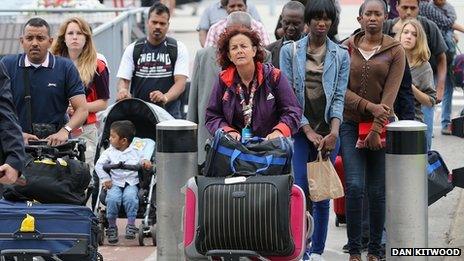Pound hits seven-year high against euro after ECB action
- Published

Investors have responded to Mario Draghi's plan to stoke the eurozone's economic engine by selling the euro.
The single currency took a 24-hour slide against the dollar starting at lunchtime on Thursday after the president of the European Central Bank said that it would pump €60bn a month into the region's economy.
The pound reached a seven-year high against the euro of €1.34.
However, the action could prove a mixed blessing for the UK.
Against the US dollar the euro hit an 11-year low of $1.1115 before recovering some ground.
The weakening euro raises the prospect of cheaper foreign holidays for Britons, but a tougher climate for the UK's exporters.
'Net negative'
Mark Carney, governor of the Bank of England, called the ECB's action a "welcome step" and "absolutely necessary to preserve the prospects of medium-term prosperity in Europe".
But not everyone agrees.
One sceptic of the plan is Roger Bootle, executive chairman of Capital Economics. "By and large for Britain it is a net negative," he said.
"Only if it succeeds in reviving the European economy is it an overall good."
In the meantime, Mr Bootle thinks it will make life tougher for British business.
"The pound going up against the euro means it's going to be even more of a struggle for British firms exporting to Europe and European firms that export to the UK will be even more effective," he said.
"Of course it brings cheaper holidays, but if it's people going on holiday who have lost their jobs because of the rise in the exchange rate, they won't be going on holiday abroad much longer."
Positive reaction
The euro has been steadily falling in value for several months in anticipation of the ECB's measures.
The currency has lost about 9% of its value against sterling over the last year.
The 1.1 trillion euro stimulus plan was launched to tackle lacklustre growth and the spectre of deflation in the 19 nation currency zone. By making more euros available, it reduces their value in the market.
An increased supply of euros should make borrowing cheaper and encourage businesses and consumers to spend more.
Jeremy Stretch, head of foreign exchange strategy at CIBC, took a more optimistic view, believing that by boosting the eurozone economy the ECB's measures were likely to "float all boats", including Britain's.
"They should be quite pleased with the way the plan is working," he said of the euro's slide.
How much further?
Mr Stretch added: "Clearly, as the euro-sterling rate comes down, it will make it more difficult in terms of export markets. But the other side of the coin is that if the actions of the ECB make the European growth story a little firmer, that is a better scenario."
"Competitive issues are tough but in the end demand is more important."
He did not believe that the euro had much further to fall as markets had largely priced in Thursday's move - unless the ECB was forced to increase the amount of money it was printing.
Bridget Roswell, senior advisor at Volterra Consulting, said if the ECB had not acted it, the euro might have ended up even weaker in the long run.
"If there were no European quantitative easing, the eurozone would see slower growth," she said. "There'd be a risk of deflation and general misery, which can be catching. You might then have seen a collapse of the euro."